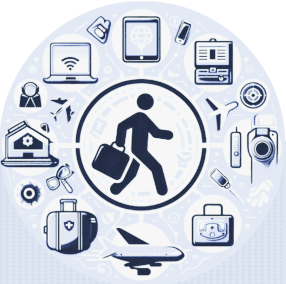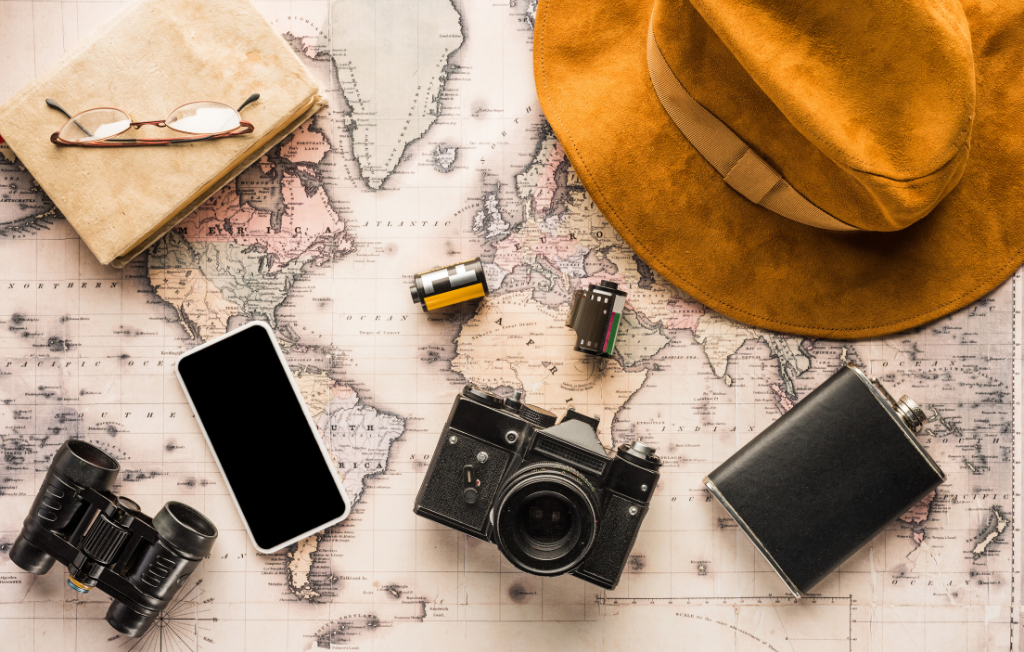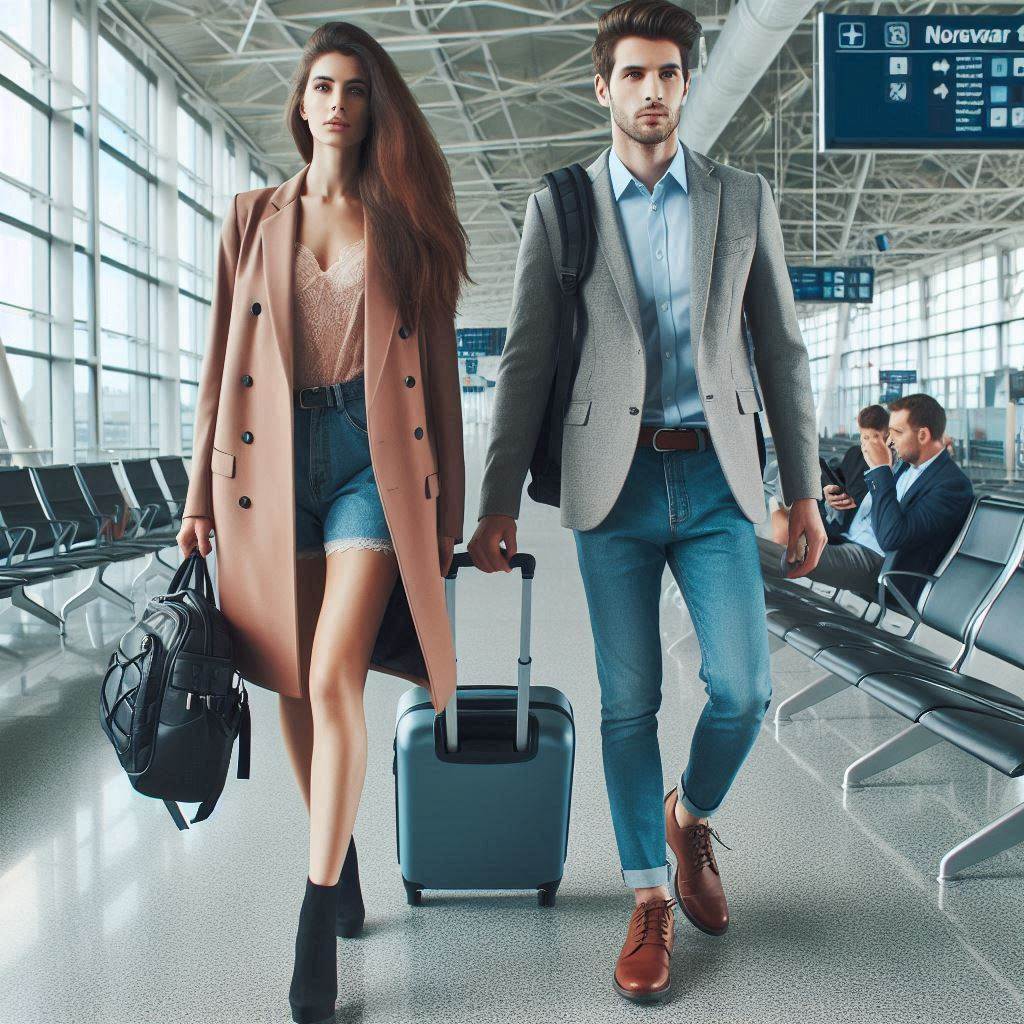This post contains affiliate links. If you purchase through these links, I may earn a commission at no extra cost to you.
Solo Travel is on the rise and offers some freedoms for Solo Journeys
Solo travel has seen a rise in popularity in recent years, with several factors contributing to the choice of “me time”. The desire for flexibility that solo travel offers and the freedom to go your own way are some of the reasons. Another is the ability to change plans as you go, which allows for more spontaneous adventures.
The pleasures of solo journeys provide an opportunity for profound self-discovery, a boost in confidence, and a deeper connection with different cultures around the world. Travelers have an opportunity to customize their experiences to match preferences and move at their own pace. These tailored experiences can lead to more of an openness to new challenges and experience unparalleled freedom to explore different cultures.
When planning a solo trip, consider your personal interests and preferences regarding travel. A top priority should always be safety when preparing for a solo journey. To combat fears of being alone on your journey, welcome the ‘solo’ mindset to help make your adventure more rewarding and enjoyable.
A positive travel experience starts with embracing the importance of safety
Absolutely! A crucial cornerstone of a positive travel experience starts with safety, especially when planning a solo excursion. These are some key considerations to take into account for a safe and gratifying experience:
Fact-Finding and Planning:
-
- Destination Safety: Thoroughly research your planned destination to get as familiar with the location as possible. Being aware of and honoring local traditions is beneficial for developing meaningful connections by showing mutual respect and creating an enhanced travel experience. Also, it is a great benefit to understand the culture, customs, and any known safety concerns for travelers to that specific area. Additionally, being aware of local laws to avoid unintended misunderstandings with traffic rules, health regulations, travel visa requirements, legal penalties, and overall personal safety, and safety concerns
- Known Health Precautions: Check for any related health concerns or advisories to the region. Also, what requirements exist for vaccinations in that area?
- Reputable Accommodation: Choose reputable accommodations, that have some type of track record or reviews, to get a better sense of any safety or comfort concerns.
- In case of Emergency Contacts: Create a list of emergency contact numbers that may be accessed by local authorities, hospitals, and your country’s embassy or consulate.
Personal Safety Measures:
-
- Be Aware: Stay aware of your surroundings and steer clear of known risky areas, especially at night.
- Travel Insurance: Travel insurance is a smart investment that covers unexpected medical emergencies, travel cancellations, and other unforeseen events.
- Secure Belongings: Secure important documents like passports, IDs, Credit Cards, etc, with the use of anti-theft bags and quality padlocks.
- Share Trip Itinerary: Inform family members and trusted friends of your travel plans so they are aware of your travel destination and time of travel.
Safe Form of Transportation:
-
- Public Transport: Utilize known and reputable transportation options. When using taxis or rideshares, be attentive and always remain cautious.
- Careful Walking Alone: When on a solo walk, choose well-lit and marked areas. Try to avoid areas that are isolated or have few people around.
- Driving: When driving in unfamiliar locations, be aware of local traffic rules and signage.
Social Gatherings:
-
- Rely on Your Instincts: When in social interactions with strangers, trust what your gut is telling you. Pay attention if something feels off. Declining invitations or interactions is not rude if it puts you in an uncomfortable situation.
- Interacting with New People: Interacting with locals and other travelers is one of the exciting parts of solo travel. Use caution, arrange to meet in public places, and take caution when sharing personal details.
Digital Safety Awareness:
-
- Cybersecurity: Avoid using public Wi-Fi networks when possible, especially when accessing sensitive information. Consider using a secure VPN when online.
- Backup Important Documents: Utilize cloud storage to store digital copies of important documents such as passports, insurance policies, pictures of credit cards and IDs, and any other important documents.
As rewarding as solo travel can be, it is imperative to prioritize safety and be prepared to ensure a memorable experience. Embrace the freedom, welcome the adventure, and safe travels!
Pre-Trip Preparedness: Safety is the Priority
Trip planning can be a bit stressful as you want your preparations to go as smoothly as possible, and safety is of the utmost importance. Whether you are flying to your destination, heading out on a road trip, or simply planning a local getaway, taking some extra preparation steps can go a long way. Let’s explore some of the important pre-trip preparations that will allow for an enjoyable and stress-free trip.
- When traveling outside of the U.S., it’s a good idea to have some form of travel medical insurance coverage, even though you may be in good health. This is important in case of an emergency or an accident. Because most U.S. health insurance does not provide coverage abroad, you may end up paying your medical expenses up front.
- A great travel habit to develop is informing those close to you about your travel plans and remembering to check in with them regularly. This is a proactive way of ensuring your whereabouts for peace of mind throughout your trip.
- Smart Packing: There are many easy-to-carry safety items that enhance your safety. Cell phone charges and portable power banks keep your lifeline juiced up. Additionally, gadgets like personal alarms, hidden money pouches, and concealable non-lethal defense devices are just some of the many personal safety items on the market.
On the Ground: Practical Tips for Day-to-Day Solo Safety
Navigation and transportation: Ensure you reach your destination safely and avoid getting lost in unfamiliar locations.
- Use A Reliable Maps App: Google Maps or Apple Maps are great apps for navigating your current location or to a specific destination. Also, you have the ability to download offline maps in case you are in a spotty internet area or lose internet access altogether.
- Using the Public Transport: Get to know the area’s local public transport system. Citymapper is a useful app that can help with routes and schedules.
- Stay Powered Up and Connected: Make sure your phone is fully charged, and it’s a good idea to carry a portable charger. Additionally, adding an international roaming plan can keep you connected, as well as a local SIM card.
- Recognized Landmarks: Familiarize yourself with local key landmarks in your area that will help you easily navigate back to your accommodations.
Selecting Your Accommodations: What features should you look for that fit your needs?
- Fact-Finding: Research accommodations that have many good reviews and pay close attention to the cleanliness and safety comments. There are several platforms to search, such as Booking.com or Airbnb.
- Convenient Location: Preferably, select a place close to essential services, a place in a safe neighborhood, preferably close to public transport and essential services.3
- Avoid Standing Out: Taking the time to learn about what is considered appropriate dressing shows respect for the local customs and avoids unwanted attention by standing out too much.
- Keeping valuables and money secure: Think about what jewelry you want to bring, if any, to avoid loss or theft. The same goes for your money; which method is most secure, cash, cashier’s checks, credit cards, or digital pay?
Handling Emergencies and Threats as a Solo Traveler
Understanding local emergency services and how to access them:
- Dial 911 or a similar number – This is the primary emergency number that connects you with a dispatcher who can then direct your call or information to the appropriate emergency personnel. If you are in another country, find out what their protocol is for accessing medical, fire, or local law enforcement.
- Give detailed information – It is critical to be as detailed as possible about your location and the nature of your emergency. This ensures that the right services are sent to the correct location as quickly as possible.
- Non-urgent calls – To make non-emergency calls, search for emergency communications centers’ numbers in the city or county where you are located.
- Disaster emergency information – Search for FEMA resources to get updated disaster information and to contact local emergency management offices when traveling.
De-escalating confrontations and avoiding risky situations:
- Stay calm and listen – Keep the volume of your voice low, trying not to mirror the aggressiveness of the other person. Listen to their concerns and acknowledge how they are feeling, then suggest acceptable ways to resolve the issue.
- Be conscious of your body language – Use an open, non-threatening posture with hands visible in a relaxed manner. Also, politely state you understand they are upset, but need to lower their voice so we can talk. This will help find some common ground and reduce tension.
- Stay aware of your location – Be aware of your surroundings, making sure to stick to populated areas and avoid being distracted by your phone or other devices. If something does not sit well with you, listen to your instincts and remove yourself from that area or situation.
- Stay confident and have a plan – Show confidence and assertiveness, and have a plan of exit if you feel unsafe.
What to do if your items are stolen or if you’re a victim of a crime:
- Calmly assess the situation – Try to remember when you last had the item to determine if it was lost or stolen. If it was stolen, report it immediately to the local police department, providing as much detail as possible so they can file a report quickly.
- Items that were stolen – In cases of stolen documents or credit cards, notify the appropriate bank, companies, and any applicable institutions to prevent unauthorized charges.
- Safety first – First, protect yourself and get to a safe location. Then, call 911 immediately and give as much detailed information as possible. This will ensure authorities act quickly on your perpetrator and get you medical attention as soon as possible.
- Try to write down or remember everything about the incident, including time, location, descriptions of the person, and anything else that would be relevant.
Resources for solo travelers in distress: Embassies, helplines, and support groups:
- U.S. Embassies abroad – These points of contact abroad can assist with lost passports, various legal issues, and other emergencies you may encounter in another country. Contact information for embassies and consulates can be found on the U.S. Department of State website.
- Important helplines – There are several valuable helplines depending on your needs; Travelers Aid International is an organization that provides help with navigating transportation centers, general distress, and connecting with local resources. U.S. Department of State Emergency Helpline for overseas emergencies. National Domestic Violence Hotline for those situations. National Human Trafficking Resource Center for issues having to do with human trafficking.
- Travelers groups – Travelers take care of other travelers through advocacy groups like Travelers United that offer support for legal advice and travel tips. Travel Buddy Networks like GAFFL and Couchsurfing connect with other travelers and find support while traveling.
- Tips to consider – The Smart Traveler Enrollment Program is available for U.S. citizens to pre-register for your trip to make it easier to receive emergency assistance from the U.S. Embassy. Also, many countries have their own support services and specific emergency helplines.
Conclusion: Experiencing Solo Travel with Confidence
- Your safety is paramount! Research and understand your destination and any travel advisories. Take the time to learn about any common scams or other concerns.
- Be proactive and make copies of all your important documents in case of loss or theft. When traveling abroad, consider enrolling in the Smart Traveler Enrollment Program so you can receive assistance in an emergency.
- Staying connected to family, friends, travel support groups, and others is important for your safety while traveling domestically or abroad. Always be aware of your surroundings and trust your instincts. Also, limit the valuables you bring with you to minimize loss and theft, limit unwanted attention, and ultimately allow for a more stress-free trip.
- Be prepared in case of an emergency by knowing the local emergency contact numbers and the number for the area’s U.S. Embassy when traveling abroad. Utilize local helplines and travel support groups when needed.
The balance between vigilance and enjoyment while traveling:
- Be mindful of your surroundings while traveling to stay safe and be aware of potential risks. Enhance your experience by fully involving yourself in the local culture, but always listen to your gut feelings.
- Research your destination and plan so you can get to know the safer areas and better understand the local dos and don’ts. This will allow you to fully engage in your experiences. Also, connecting with locals can provide valuable insights, adding to your enjoyment.
- Stay connected with friends or family regarding your plans. Before heading out on your trip, make sure to share your itinerary with someone you trust to take action in the event of an emergency.
- Traveling solo can be an incredibly rewarding experience. Be open to new experiences by stepping out of your comfort zone and allowing yourself to fully take in the joys of traveling to new destinations. Safe travels!


